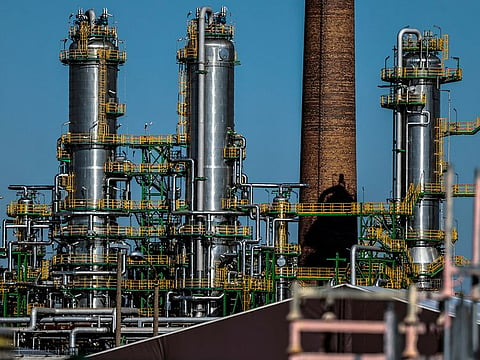Clearly, there needs to be a different approach to resolve Russia-Ukraine conflict
More releases from US and allies’ oil reserves could be even more counter-productive

We expected that the decision taken by the US and some other countries to use oil reserves would help cut fuel prices and compensate for Russian production and supplies. Yet, the exact reverse set of results happened, and faster than we thought.
After Washington announced the pumping of one million barrels of its strategic reserves per day, oil fell 9 per cent to $104 per barrel. But once the US oil reserves declined by 8 million barrels, according to the US Energy Information Administration, oil jumped to $108 at the end of last week. However, prices dropped again early this week, owing to the temporary lockdown of Shanghai after the recurrence of COVID-19. Yet, this too will pass and force prices to rise again.
Oil at $185?
Realistically, if the US and allies continue to use their reserves, refilling those stock will certainly lead to a significant rise and with completely counterproductive results. This has prompted the investment bank JP Morgan to issue a warning of an oil barrel even reaching $185. On the other hand, the Russian production will not be affected much as the country’s oil and gas are still being exported. China and India announced that they would not boycott Russian oil.
For example, India has bought 15 million barrels of Russian oil since the start of the Russian military operation in Ukraine and paid in dollars using regular banking channels, as do most EU countries. The Indian government also plans to buy substantial Russian oil through long-term contracts as it gets steep discounts. A similar move is being taken by China and some Asian countries that consider Russian oil as an opportunity to meet their needs at lower prices.
This simply means sanctions will most likely fail to achieve the desired targets as expected. The US Treasury Secretary Janet Yellen said last week that “an immediate ban by the EU would clearly raise global oil prices and ‘would have a damaging impact on Europe and other parts of the world”.
She is totally right considering oil and gas’ role in the global economy, which is suffering from the repercussions of the Ukrainian crisis. And consequently, the World Bank reduced its forecast for global growth in 2022 from 4.1 per cent to 3.2 per cent, warning at the same time of a debt crisis.
This means that almost all countries will suffer from this crisis, and the effects will be seen in the form of price hikes and high rates of inflation in addition to the possibility of famines in some poor countries that depend on imports of Russian and Ukrainian wheat.
Short-sighted bloc approach
If truth be told, the sanctions imposed on Russia are completely different from all the previous ones since World War II. These affect not only Russia, but all countries. In short, this is a paradox that needs to be reconsidered, especially as sanctions and counter-sanctions are still being raised with no prospect of a solution looming on the horizon. We will not be exaggerating if we said that everyone will be exposed to heavy losses if things remain as they are.
Thus, the crisis must be handled by exerting extra diplomatic efforts to find a solution and avoiding any escalation that will only lead to human and material losses. It is clear there are now two conflicting blocs - the first calls for escalation, indifferent to the catastrophic results, while the other calls for de-escalation and peaceful solutions to end this crisis. And sparing the world of more crises caused by shortages in basic commodities.



